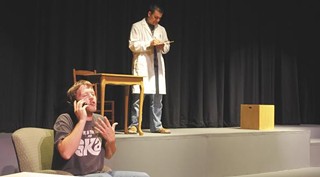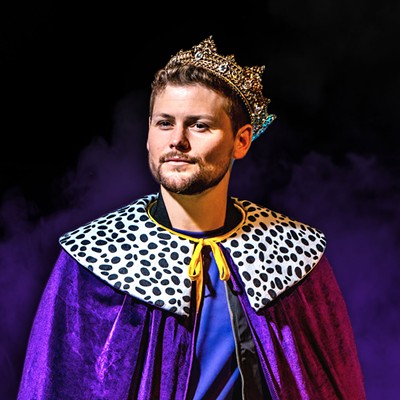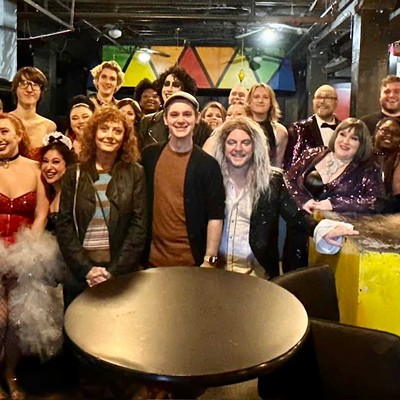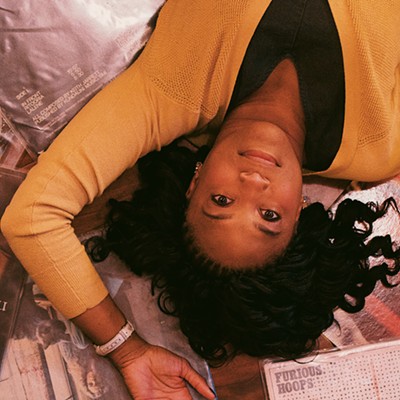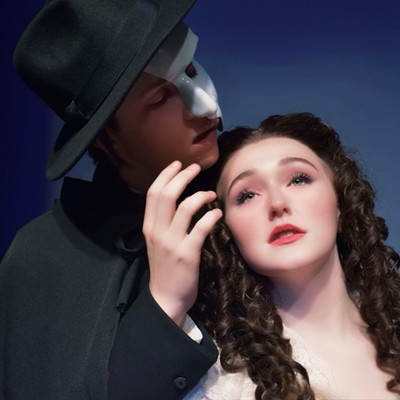More than 250 submissions were received for Armstrong Atlantic State University’s 2010 Coastal Empire New Play Festival. Just three will be performed by the Masquers company this weekend.
“It’s a lot like gold–panning,” says theater instructor Eric Kildow, who read every single submitted script. “You are going to find a whole lot of truly, truly awful stuff. And then you find some stuff that needs a little bit of work, but you could maybe do something with it.
“And you find some really delightful stuff as well.”
Kildow, who whittled the big pile down to 30 scripts before passing the responsibility onto a team of judges, brainstormed the New Play Festival three years ago.
“The sad fact about it is that there are always going to be more scripts than there are production opportunities,” he explains. “So we tried to alleviate that a little bit, and do something that isn’t being done a whole lot in this region: New works.”
All three of the produced plays are one–acts, previously unpublished and unperformed. Submissions came from as far away as Russia and Australia.
The first ones to hit the circular file were those plays that required large casts or multiple set changes. “Those are things we are not really equipped to deal with,” Kildow says.
“Then, the first thing we do is work to recruit the directors. We look at students who have directed for the Masquers season before, or have just finished the directing class, so we have sort of an idea of the quality of their work.
"And then we look at people’s schedules; we sort of try to match it up by temperament as well.”
As with all AASU Masquers productions, the actors are chosen by audition.
Here are the works you’ll see this week in the Jenkins Hall theater:
It’s So Different Out There: Savannah’s Gabriel Ricard calls his two–person play “a throwback to a Twlight Zone kind of energy. It’s about two people – a guy and a girl – who live in a cage in the middle of nothingness. We don’t know anything about them except that they’ve been there for hundreds of years, and they really don’t know anything beyond their existence in this cage.”
Occasionally, the male character opens the door – but he doesn’t have the courage to venture outside. “One day, the girl says she’s had enough, she’s going through,” Ricard explains. “And the story takes off from there.”
The tale’s origin is just as peculiar. “My mother used to breed and sell rats,” says Ricard. “We literally had dozens of rat cages. In one of the cages lived this old rat, he was blind and crippled and pitiful. But somehow, some way, he could open his cage door. He would run around the living room, and scare the dog, and play in the dog food ... just have himself a time.
“And then he’d run back to his cage. He did that until he died.”
Hold: Brooklyn–based playwright Ruben Carbajal contributed this scathing dark comedy about a nameless man trying to get help through a suicide hotline. One operator after another – he keeps getting switched around – is rude, oblivious and argumentative, leaving the man (depressed over his recent divorce and the loss of a custody battle over his son) in worse shape than when he first placed the call.
Ironically, another of Carbajal’s plays was produced at the 2009 AASU festival (the judges read each script without knowing the author’s name).
Breadcrumb Sins: It’s 1936, and a photographer on assignment from the Works Progress Administration is in South Georgia to shoot pictures of an Evangelical tent revival. “She ends up falling in love with the preacher’s wife,” says playwright Neeley Gossett.
“My family was Southern Baptist,” explains Gossett, who teaches English at Georgia Perimeter College in Atlanta. “I’ve grown up in the South and always just had that as part of my life.”
Gossett’s in the MFA program at Virginia’s Hollins College, studying (during the summer) to be a playwright. “Last summer, we were talking about what subjects can you tell the best that no one else can? So I was trying to figure out, what is the story of my life, and what do I have that I may able to tell better than somebody from another part of the country? Or somebody with a different experience?”
And so Breadcrumb Sins was born. “I’m sort of trying to find my own voice and write not necessarily from personal experience but from the area I come from. To see, with language, what I have that’s different from everybody else.”
In her play, the photographer is only making a stop in Georgia before heading south for the Everglades. The preacher’s wife, Gossett explains, therefore faces a dilemma: “Do I stay in the world I know, and that I know is safe, or do I take an adventure and go with something that I don’t know?”
2010 Coastal Empire New Play Festival
Where: Jenkins Hall, Armstrong Atlantic State University campus, 11935 Abercorn St.
When: At 7:30 p.m. April 29-30 and May 1; at 3 p.m. May 2
Admission: $10 (free for AASU staff, faculty, and students)
Information: (912) 344–2801

